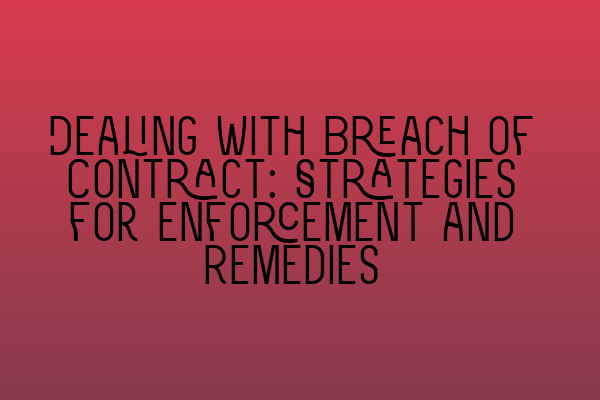Dealing with Breach of Contract: Strategies for Enforcement and Remedies
Contracts are the foundation of business transactions and serve to establish rights and obligations between parties. When one party fails to fulfill their contractual duties, it is considered a breach of contract. In such cases, it is essential to have a robust strategy for enforcement and securing remedies to protect your interests. This blog post will delve into effective strategies to deal with breach of contract, ensuring you are equipped with the knowledge to navigate this complex legal terrain.
1. Understanding Breach of Contract:
Before exploring remedies, it is crucial to identify and establish the breach of contract. A breach can occur through non-performance, inadequate performance, or anticipatory breach, where one party indicates their inability or refusal to fulfill contractual obligations. Familiarize yourself with the terms and provisions of the contract to accurately determine the nature and extent of the breach.
2. Reviewing the Contractual Remedies:
Contracts typically contain provisions specifying the remedies available in the event of a breach. Common remedies include damages, specific performance, and termination of the contract. By carefully analyzing the contract, you can ascertain the available courses of action and weigh their feasibility and efficacy.
For a comprehensive examination of remedies available in breach of contract scenarios, check out our related article: SQE 2 Preparation Courses.
3. Pursuing Damages:
Damages are a common remedy sought by the aggrieved party as compensation for the loss suffered due to the breach. There are two main types of damages:
a. Compensatory Damages:
Compensatory damages aim to put the non-breaching party in the position they would have been in had the breach not occurred. This includes recovering actual and estimated losses incurred due to the breach.
b. Consequential Damages:
Consequential damages cover losses that are not directly caused by the breach itself but are incurred as a result of the breach. Examples include lost profits or business opportunities.
To gain a fuller understanding of damages and their assessment in breach of contract cases, refer to our informative article: SQE 1 Practice Exam Questions.
4. Seeking Specific Performance:
In certain situations, monetary compensation may not effectively remedy the breach. Specific performance, a remedy often sought when dealing with unique goods or services, allows the court to order the breaching party to fulfill their contractual obligations. It is crucial to evaluate the feasibility and practicality of specific performance given the circumstances.
For an in-depth exploration of specific performance as a remedy, read our related article: SQE 1 Practice Mocks FLK1 FLK2.
5. Considering Termination:
When a breach is severe or recurring, termination of the contract may be necessary. Termination effectively extinguishes the rights and obligations of the parties involved. However, it is crucial to review the contract for any termination clauses or notice requirements before proceeding with this course of action.
To learn more about terminating contracts, please visit our informative article: SQE 1 Preparation Courses.
6. Assesing Alternative Dispute Resolution (ADR) Options:
Before initiating formal legal proceedings, it is worth considering alternative dispute resolution mechanisms such as negotiation, mediation, or arbitration. These methods often provide a more cost-effective and expeditious resolution, allowing parties to maintain their business relationships while resolving the breach of contract.
For more information on alternative dispute resolution methods, visit our comprehensive article about SRA SQE Exam Dates: SRA SQE Exam Dates.
In conclusion, dealing with breach of contract requires a strategic approach to protect your interests and secure appropriate remedies. By understanding the breach, assessing available remedies, and considering alternative dispute resolution options, you can effectively navigate these challenging situations. Remember, seeking professional legal advice is crucial to ensure your enforcement and remedial strategies align with the specific circumstances of your case.
For further resources and guidance, check out our SQE Contract Law Preparation Courses for comprehensive preparation and practice materials.
